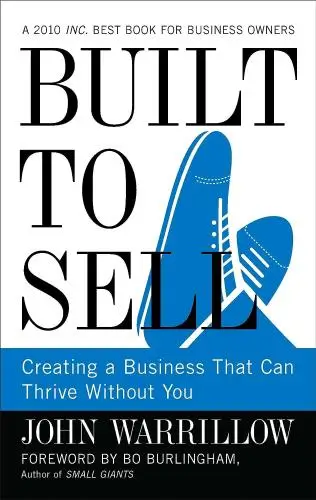Venture Deals
Be Smarter Than Your Lawyer and Venture Capitalist
What's it about?
Venture Deals is your insider's guide to the intricate world of venture capital. It demystifies the complex dynamics between investors and entrepreneurs, breaking down terms, negotiations, and strategies with clarity. Whether you're a startup founder dreaming of scaling your venture, or an investor looking to make savvy choices, this book offers invaluable insights into making successful deals. Discover the secrets behind successful funding rounds and learn how to navigate the venture landscape with confidence.
About the Author
Brad Feld is an American entrepreneur, author, and venture capitalist, co-founder of Techstars. His work primarily focuses on startup ecosystems, venture capital, and entrepreneurship. Feld is known for his practical advice, deep insights into the tech industry, and contributions to understanding the dynamics between startups and venture capital.
10 Key Ideas of Venture Deals
Mastering the Art of Term Sheet Negotiations
Understanding and negotiating the term sheet is crucial as it lays the foundation for the entire venture deal.
It's important to focus on key terms such as valuation, liquidation preferences, and vesting schedules rather than getting lost in the minutiae.
Effective negotiation involves knowing what can be compromised and what must be steadfastly defended to protect your interests and ensure a fair deal.
Learn DeeperResearch and Understand Each Term: Before entering negotiations, take the time to thoroughly understand each term on the sheet. Use resources like books, online courses, or mentors to get a solid grasp of what terms like 'valuation', 'liquidation preferences', and 'vesting schedules' mean and how they affect your deal.
Prioritize Your Terms: Make a list of terms that are most important to you and your company's future. Decide in advance which terms you are willing to negotiate on and which are non-negotiable. This will help you stay focused during discussions.
Seek Professional Advice: Don't hesitate to hire a lawyer or a financial advisor who specializes in venture deals. Their expertise can be invaluable in helping you understand the implications of each term and in strategizing your negotiation stance.
Practice Your Negotiation Skills: Before you go into actual negotiations, practice with a mentor or colleague. Role-playing different scenarios can help you prepare responses and strategies for various negotiation outcomes.
Communicate Clearly and Confidently: During negotiations, be clear about what you want and why. Use the knowledge you've gained to back up your positions. Confidence, backed by thorough preparation, can significantly influence the negotiation process.
- Example
Imagine you're negotiating a term sheet and the investor proposes a 4x liquidation preference. Knowing the potential impact on your returns in various exit scenarios, you counter with a detailed explanation of why a 1x liquidation preference is more equitable, using market standards and the long-term vision for your company as part of your rationale.
- Example
During the vesting schedule discussion, you realize the proposed schedule could disincentivize early employees who have been with the company since its inception. You propose an alternative schedule that accelerates vesting for founding team members, supporting your argument with data on how such schedules have positively impacted employee retention and motivation in similar startups.
The Significance of Valuation and Its Impact
Valuation isn't just a number; it reflects the company's current worth and future potential.
A realistic valuation is pivotal for attracting the right investors without diluting ownership excessively.
Entrepreneurs should understand pre-money and post-money valuation concepts to negotiate effectively and comprehend how much of the company they are giving away with each funding round.
Learn DeeperUnderstand Your Company's Value: Start by thoroughly understanding your company's current financial health and its potential for growth. This involves analyzing revenue, profit margins, market size, and your position within the industry.
Learn Valuation Techniques: Familiarize yourself with different valuation methods such as discounted cash flow (DCF), comparables analysis, and venture capital method. Knowing these can help you better understand how investors might value your company.
Negotiate Wisely: When entering negotiations, be prepared to discuss your company's valuation confidently. Use your understanding of valuation techniques to justify your company's worth and negotiate terms that don't excessively dilute your ownership.
Seek Professional Advice: Consider consulting with a financial advisor or an experienced entrepreneur to get an objective perspective on your company's valuation. This can provide valuable insights and help you avoid common pitfalls.
- Example
Imagine you're the founder of a tech startup seeking Series A funding. You've determined your pre-money valuation to be $5 million based on your revenue, market potential, and comparables in the industry. An investor offers $1 million for a 20% stake, which aligns with your valuation, indicating a post-money valuation of $6 million. Understanding these concepts helps you realize the deal's fairness and how it affects your ownership.
- Example
Consider a scenario where you're negotiating with an investor who suggests a significantly lower valuation than you expected. Armed with knowledge about your company's financials and growth potential, along with various valuation methods, you're able to present a compelling argument that justifies a higher valuation, leading to more favorable investment terms without giving away too much equity.
Navigating the Complexities of Liquidation Preferences
Liquidation preferences determine the payout order in the event of a sale or liquidation.
They protect investors by ensuring they recoup their investment before others.
However, aggressive liquidation preferences can disadvantage founders and employees.
Striking a balance is key, aiming for a 1x non-participating preference to align interests fairly.
Learn DeeperUnderstand Your Term Sheet: Before signing any investment deal, make sure you fully understand the term sheet, especially the section on liquidation preferences. Don't hesitate to ask your investors or a legal advisor for clarifications.
Negotiate Fair Terms: Aim for a 1x non-participating liquidation preference. This means investors get their money back first in a liquidation event, but then the remaining assets are distributed among all shareholders, including founders and employees.
Consider the Long-Term Impact: When negotiating liquidation preferences, think about how they will affect your company's future financing rounds and your ability to attract talent. Aggressive terms might deter future investors or valuable team members.
Educate Your Team: Make sure your co-founders and key employees understand the implications of liquidation preferences. This knowledge will empower them during negotiations and help align everyone's interests towards the company's success.
- Example
Imagine your startup is raising a Series A round, and a venture capital firm offers $5 million at a 2x participating liquidation preference. This means they want twice their investment back before anyone else gets paid, and then they also want to participate in the remaining distribution. Recognizing this could severely dilute the payout for founders and employees in a sale, you negotiate down to a 1x non-participating preference, ensuring a fairer distribution.
- Example
Your friend's company is being acquired for $50 million. They had raised $10 million in venture capital with a 1x non-participating liquidation preference. The investors get their $10 million back first, and the remaining $40 million is distributed among all shareholders, including the founding team and employees with equity. This scenario highlights the importance of understanding and negotiating liquidation preferences to ensure everyone benefits fairly from the company's success.
Understanding Anti-Dilution Provisions for Long-Term Protection
Anti-dilution provisions safeguard investors from future equity dilution if the company issues shares at a lower valuation.
While necessary for investor confidence, overly stringent anti-dilution clauses can deter future investment and harm founder equity.
Aim for a broad-based weighted average calculation to mitigate these risks while maintaining investor protection.
Learn DeeperUnderstand the Basics: Start by familiarizing yourself with the fundamental concepts of equity, dilution, and anti-dilution provisions. Knowing these basics will help you grasp why these clauses are crucial for both investors and founders.
Learn About Different Anti-Dilution Provisions: There are several types of anti-dilution provisions, such as full ratchet and weighted average. Dive into each type to understand their implications. Aim to understand why a broad-based weighted average is often recommended for balancing protection and fairness.
Negotiate Fair Terms: If you're in a position to negotiate these terms, strive for a balance that protects investors without unduly penalizing the founding team. This might involve negotiating the specifics of how dilution protection is calculated or capped.
Seek Professional Advice: Before finalizing any investment agreement, consult with a legal or financial advisor who specializes in venture deals. They can provide personalized advice tailored to your situation, helping you navigate the complexities of anti-dilution provisions.
Educate Your Team: If you're part of a startup, ensure that your co-founders and key team members understand the implications of anti-dilution provisions. A well-informed team can make better decisions about future funding rounds and equity distribution.
- Example
Imagine a startup that's negotiating its Series A funding round. The founders and the investors agree on a broad-based weighted average anti-dilution provision. This means if the company issues new shares at a lower price in the future, the original investors' shares will be adjusted in a way that considers the total number of shares outstanding and the price of the new shares, rather than simply matching the new, lower price. This protects the investors from dilution but doesn't overly penalize the founders.
- Example
Consider a scenario where a company needs to raise more funds after a downturn in its valuation. Thanks to a well-negotiated anti-dilution clause, the company can issue new shares without fear of alienating early investors. The clause ensures that while the new shares are issued at a lower price, the early investors receive additional shares to compensate for the dilution, but in a manner that's fair and doesn't give them an undue advantage over the founders or new investors.
The Critical Role of Board Composition and Governance
Board composition is a delicate balance that influences decision-making and company direction.
A well-structured board includes founders, investors, and independent members who provide diverse perspectives.
Ensuring the board has the right mix of expertise and independence is essential for effective governance and strategic guidance.
Learn DeeperDiversify Board Composition: When forming or restructuring your board, aim for a mix of founders, investors, and independent members. This diversity ensures a wide range of perspectives, which is crucial for balanced decision-making.
Regularly Evaluate Board Performance: Implement an annual or bi-annual review process for the board. This helps in assessing whether the board's composition still aligns with the company's strategic direction and governance needs.
Encourage Continuous Education: Promote ongoing learning and development for board members. This could be through workshops, seminars, or even informal discussions on relevant topics. A well-informed board is more effective.
Foster Open Communication: Create an environment where board members feel comfortable sharing their opinions and concerns. Regular, open dialogue can uncover potential issues early and lead to more collaborative problem-solving.
- Example
A tech startup at its early growth stage includes two founders, two venture capital investors, and one independent member with extensive industry experience. This composition balances entrepreneurial drive with financial acumen and sector-specific knowledge.
- Example
A non-profit organization restructures its board to include members from diverse backgrounds, including finance, community service, and technology. This change leads to more innovative fundraising strategies and broader community engagement.
Deeper knowledge. Personal growth. Unlocked.
Unlock this book's key ideas and 15M+ more. Learn with quick, impactful summaries.
Read Full SummarySign up and read for free!
Venture Deals Summary: Common Questions
"Term sheets are like a prenuptial agreement. Hopefully, you'll never need to refer to it, but if things go sideways, having one in place can save you from getting screwed." This analogy from Venture Deals really stuck with me as I delved into the intricacies of startup funding. The book breaks down complex terms in a clear and digestible way, making it a valuable resource for anyone navigating the world of venture capital.
The sections on valuation and negotiation tactics were particularly enlightening, providing actionable insights that can benefit both entrepreneurs seeking funding and investors looking to understand the dynamics of deal-making. While some parts got a bit technical, the real-world examples and case studies helped solidify key concepts. If you're interested in startups, investments, or entrepreneurship, I highly recommend diving into Venture Deals.
In summary, Venture Deals is a must-read for anyone looking to gain a comprehensive understanding of how venture capital works. It's a practical guide that empowers readers to navigate the complexities of funding with confidence.
Experience Personalized Book Summaries, Today!
Discover a new way to gain knowledge, and save time.
Sign up for our 7-day trial now.
No Credit Card Needed

Similar Books

$100M Offers
Alex Hormozi
Principles of Marketing, Global Edition
Gary Armstrong
The 100 Best Business Books of All Time
Jack Covert
Playing to Win
A.G. Lafley
Productize
Eisha Armstrong
Start Your Own Pet-Sitting Business and More
Entrepreneur Press
The 22 Immutable Laws of Marketing
Al Ries
The Upstarts
Brad Stone
Lean Analytics
Alistair Croll
Built to Sell
John WarrillowTrending Summaries

Peak
Anders Ericsson
Never Split the Difference
Chris Voss
Smart Brevity
Jim VandeHei
The Psychology of Money
Morgan Housel
The First 90 Days
Michael D. Watkins
Atomic Habits
James Clear
Thinking, Fast and Slow
Daniel Kahneman
The Body Keeps the Score
Bessel van der Kolk M.D.
The Power of Regret
Daniel H. Pink
The Compound Effect
Darren HardyNew Books

The White Night of St. Petersburg
Michel (Prince of Greece)
Demystifying Climate Models
Andrew Gettelman
The Hobbit
J.R.R. Tolkien
The Decision Book
Mikael Krogerus
The Decision Book: 50 Models for Strategic Thinking
Mikael Krogerus
Fichte
Johann Gottlieb Fichte
Do No Harm
Henry Marsh
This is Going to Hurt
Adam Kay
This Is Your Brain on Joy
Earl Henslin

